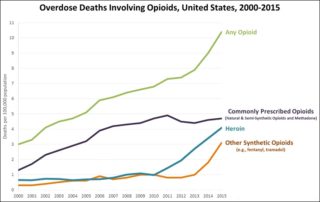
U.S. Attorney General Jeff Sessions is worried about this country’s “historic drug epidemic and potentially long-term uptick in violent crime.” Because he is so worried, Sessions has spent the past month doing things like: (1) asking his old colleagues for funds to prosecute the War on Drugs, including medical marijuana; (2) writing letters to state Governors with “serious questions” about their local cannabis programs (which letters the states have politely observed are misleading and inaccurate); and (3) disseminating bogus weed statistics far and wide. Every day that Sessions perseverates on cannabis enforcement, an average of 142 Americans die from opioid abuse, per the Centers for Disease Control. And since 1999, a total of 560,000 drug overdose deaths have occurred. That number is accelerating.
If Jeff Sessions were truly concerned about our nation’s historic drug epidemic, he would not be scheming to shutter state cannabis programs. Instead, he would be taking action against the bad actors who have fueled the opioid epidemic. Specifically, he would be filing public interest lawsuits, like last week’s bombshell filed by Multnomah County (the home of Portland, Oregon). As it stands, however, the federal government has done little to engage the opioid crisis apart from commissioning a report, and Sessions has done nothing. It tends to boggle the mind.
As with cannabis law and policy, the federal government has been terribly slow and backward in its consideration of the opioid crisis. This means that once again, states and local jurisdictions are being forced to take the lead. Lately, these localities have been doing so with gusto: a growing number are suing pharmaceutical companies and doctors for causing a public health hazard by pushing opioids on their citizens. Fundamentally, this is the same strategy that states first pursued in the 1990s with lawsuits against Big Tobacco. The local governments are essentially saying: you guys knew what you were doing all along with opioids; we are going to make you stop and make you pay.
In legal terms, the allegations in these cases include tort claims like public nuisance, fraud, conspiracy, negligence, gross negligence, etc. These lawsuits contain jarring and memorable lines, such as “the Purdue Frederick Company, Inc., is a convicted felon and admitted liar.” The filings also detail the methods used by the defendants to push their highly addictive products, and they contain demoralizing statistics, such as:
- Opioids are now the most prescribed class of drugs, generating $11 billion in revenue for drug companies in 2014 alone;
- Since 1999, the amount of prescription opioids has nearly quadrupled;
- In 2010, some 254 million prescriptions for opioids were filled in the U.S. – enough to medicate every adult in America around the clock for a month;
- In 2010, 20% of all doctors’ visits resulted in the prescription of an opioid;
- While Americans represent only 4.6% of the world’s population, they consume 80% of the opioids supplied around the world and 99% of the global hydrocodone supply; and
- By 2014, nearly two million Americans either abused or were dependent on opioids.
And Jeff Sessions is concerned about marijuana.
According to its website, the mission statement of the Department of Justice (DOJ) is to “…ensure public safety against threats foreign and domestic; to provide leadership in preventing and controlling crime; [and] to seek just punishment for those guilty of unlawful behavior…”. With respect to controlled substances in general and opioids in particular, DOJ should be doing all of these things. It is not. Instead, it is beating about the bushes with states on cannabis.
The opioid crisis kills 146 Americans every single day; conversely, even the U.S. Drug Enforcement Administration acknowledges that no one has ever died of a cannabis overdose. If Jeff Sessions and DOJ continue to waste valuable federal resources investigating state-legal weed and not the opioid crisis, it will be an American travesty. In fact, it already is one.























